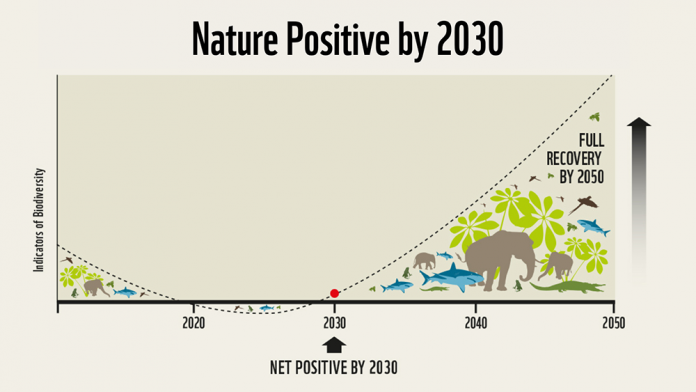In today’s business environment, sustainability is an essential component of long-term success for any company.
Consumers, investors, and regulators are increasingly asking businesses to go beyond ‘doing no harm’ and actively regenerate the natural world. Embracing a Nature Positive approach not only aligns with global environmental goals but also opens up vast economic opportunities. According to the World Economic Forum (WEF), transitioning to a Nature Positive approach in business could create $10.1 trillion in business opportunities and 395 million jobs by 2030.
Nature Positive is a global goal aimed at halting and reversing nature loss by 2030, based on a 2020 baseline, so that we can work towards full recovery by 2050. It is linked to the Kunming-Montreal Global Biodiversity Framework (GBF), which was adopted by 196 governments in December 2022. Widely considered the “Paris Agreement for Nature,” the Nature Positive Global Goal recognises the interconnected relationship between climate warming and nature loss. Net Zero and Nature Positive go together in any serious business strategy.
Adopting a net zero and nature-positive approach offers businesses a wide range of benefits. By developing a nature strategy, companies can reduce their negative environmental impacts while increasing resilience in the face of ecological and market challenges. This approach also unlocks new commercial opportunities and fosters long-term value creation, aligning with stronger climate and sustainability goals. In addition, a nature-positive mindset helps businesses identify and mitigate supply chain risks, enhancing operational security. It also makes companies more attractive to employees, particularly younger generations like Generation Z, who prioritize environmental responsibility. Finally, this approach can inspire innovation, driving growth and profitability by aligning business practices with the regenerative potential of nature.
The 2021 Green Finance Institute report, The Finance Gap for UK Nature, estimated a funding gap of between £44 billion and £97 billion required to meet all our nature-related goals for 2030. The cost of inaction is even higher. According to the World Bank, a collapse of ecosystem services would cause annual losses estimated at $2.7 trillion by 2030. Amid the current lack of clearly defined nature-positive pathways for businesses, particularly SMEs, we’re creating Emiel’s Food Forest as a living example of how businesses can contribute to nature restoration.
Earthself Community Interest Company has partnered with Talladh-a-Bheithe Estates and UHI Inverness to create one of Scotland’s first community food forests and explore how these could become viable nature-based solutions for SMEs while driving community benefit. We’re planting the first phase of the food forest on 18th-20th October 2024, ahead of the next Biodiversity COP16. Sixteen students from five different universities across Scotland are coming to help and learn how they can become food forest ambassadors, seeding the creation of many more food forests across Scotland.
We’re calling on Scottish businesses to join us now in exploring how nature-positive practices and food forests can benefit your business while contributing to a Scotland where all life thrives. Get in touch: tabi@earthself.org







